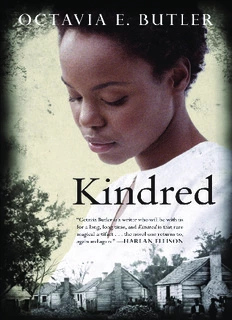
Kindred - LibreBood PDF
Preview Kindred - LibreBood
KINDRED KINDRED Octavia E. Butler BEACON PRESS BOSTON Beacon Press 25 Beacon Street Boston, Massachusetts 02108 www.beacon.org Beacon Press books are published under the auspices of the Unitarian Universalist Association of Congregations. © 1979 by Octavia E. Butler Reader’s Guide © 2003 by Beacon Press First published as a hardcover by Doubleday in 1979 First published as a Beacon paperback in 1988 All rights reserved Printed in the United States of America 13 12 11 10 09 14 13 12 11 10 This book is printed on acid-free paper that meets the uncoated paper ANSI/NISO specifications for permanence as revised in 1992. Library of Congress Cataloging-in-Publication Data Butler, Octavia E. Kindred / Octavia E. Butler ; with an afterword by Robert Crossley. p. cm. — (Black women writers series) Includes bibliographical references. ISBN 978-0-8070-8369-7 (alk. paper) 1. African American women—Fiction. 2. Los Angeles (Calif.)— Fiction. 3. Southern States—Fiction. 4. Slaveholders—Fiction. 5. Time travel—Fiction. 6. Slavery—Fiction. 7. Slaves—Fiction. I. Title. II. Series. PS3552.U827K5 2004 813'.54—dc22 2003062862 To Victoria Rose, friend and goad Contents PROLOGUE 9 THE RIVER 12 THE FIRE 18 THE FALL 52 THE FIGHT 108 THE STORM 189 THE ROPE 240 EPILOGUE 262 READER’S GUIDE 265 Critical Essay 265 Discussion Questions 285 Prologue I lost an arm on my last trip home. My left arm. And I lost about a year of my life and much of the comfort and secu- rity I had not valued until it was gone. When the police released Kevin, he came to the hospital and stayed with me so that I would know I hadn’t lost him too. But before he could come to me, I had to convince the police that he did not belong in jail. That took time. The police were shadows who appeared intermittently at my bedside to ask me questions I had to strug- gle to understand. “How did you hurt your arm?” they asked. “Who hurt you?” My atten- tion was captured by the word they used: Hurt. As though I’d scratched my arm. Didn’t they think I knew it was gone? “Accident,” I heard myself whisper. “It was an accident.” They began asking me about Kevin. Their words seemed to blur together at first, and I paid little attention. After a while, though, I replayed them and suddenly realized that these men were trying to blame Kevin for “hurting” my arm. “No.” I shook my head weakly against the pillow. “Not Kevin. Is he here? Can I see him?” “Who then?” they persisted. I tried to think through the drugs, through the distant pain, but there was no honest explanation I could give them—none they would believe. “An accident,” I repeated. “My fault, not Kevin’s. Please let me see him.”
Description: